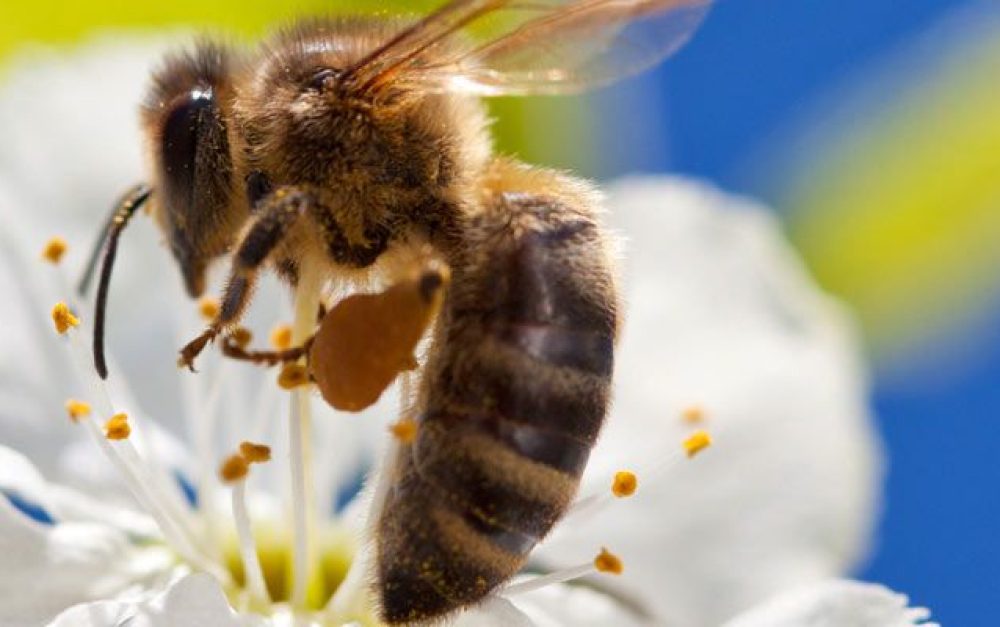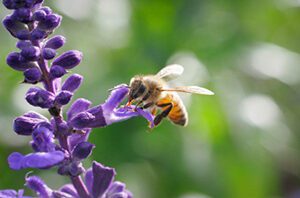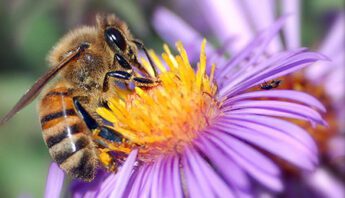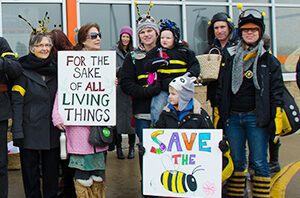Poll shows 51 percent of Americans are more likely to shop at retailers that formally committed to stop selling bee-killing pesticides
Sacramento, CA – A report released today showed a decrease in the number of “bee-friendly” home garden plants sold at major retailers that have been pre-treated with pesticides shown to harm and kill bees. The study of plants purchased at Home Depot (NYSE: HD), Lowe’s (NYSE: LOW), Ace Hardware, True Value and Walmart (NYSE: WMT) was conducted by PAN North America, Friends of the Earth, Pesticide Research Institute, as well as other allies across the country.
The report, Gardeners Beware 2016, is a follow-up to testing conducted in 2013 and 2014 that demonstrated the presence of bee-toxic neonicotinoid insecticides (neonics) in more than half of bee-attractive flowers tested. The 2016 analysis found that 23 percent of flowers and trees tested nationally — and 15 percent tested in California — contain neonicotinoid insecticides at levels that can harm or kill bees. The results indicate that stores are selling far fewer plants treated with bee-killing neonics than in 2014.
Advocates suggest that the change in store policies is the result of retailer commitments to eliminate or phase-out neonicotinoid use on garden plants. These commitments are having a ripple effect in production methods by suppliers and have resulted in reduced use of neonicotinoids in common garden plants overall.
Larger retailers Home Depot and Lowe’s already made commitments to phase out use of these pesticides. The new data demonstrates that these two companies are making progress toward that goal. Ace Hardware, True Value and Walmart have not yet made similar commitments to eliminate neonics in their stores.
“Retailers are responding to the call for greater protections for pollinators and the market appears to be shifting away from selling bee-killing pesticides,” said Paul Towers, organizing director and policy advocate with PAN. “All retailers, including Ace Hardware and True Value, should get neonicotinoid pesticides out of their plants and off their shelves as quickly as possible.”
A new YouGov Poll commissioned by Friends of the Earth and Sum of Us released today found that 67 percent of Americans feel more positively about Home Depot and 66 percent feel more positively about Lowe’s because of their formal commitments to eliminate neonics on their shelves. Following this survey, half of respondents said they are more likely to shop at Home Depot (50%) and Lowe’s (51%) because of the store’s commitment. Further, more than a third (39%) said they’d feel more negatively about a retailer that had not formally committed to eliminating systemic neonicotinoid insecticides in their stores.
California policymakers introduced legislation (SB 1282) earlier this year that would have mandated label on neonic-treated plants and seeds sold at nurseries. The bill failed to pass the Senate floor under intense pressure from industrial agricultural interest groups.
“SB 1282 would have empowered consumers by informing them about plants and seeds that have been treated with harmful bee-killing pesticides,” said Senator Mark Leno (SD 11 – San Francisco), lead author of the legislation. “While I am disappointed the bill did not pass the Legislature, I am heartened to see a growing awareness and commitment to this important issue.”
More than 100 businesses, cities, universities, states and countries around the world have restricted use of these insecticides. Greenhouse Grower’s 2016 State Of The Industry Survey found 74 percent of growers who supply mass merchants and home improvement chains said they will not use neonicotinoid insecticides in 2016.
“Our data indicates that compared to two years ago, fewer nurseries and garden stores are selling plants pre-treated with systemic neonicotinoid insecticides,” said Susan Kegley, Ph.D., author of the report from the Pesticide Research Institute in Santa Rosa. “Yet it’s still not possible for a gardener to be sure that the plants they select at the store will be safe for bees and other pollinators. Retailers should work with their suppliers to speed up their phase out of bee-harming pesticides.”
Flowering trees are frequently used in landscaping city streets and business campuses, providing nectar for bees, seeds for birds and shade for humans. Unfortunately, the results of the new report show that systemic neonicotinoids are commonly used in tree production, and could be a major source of exposure for urban pollinators.
“We’re heartened by progress made to protect bees in urban and agricultural settings,” said urban beekeeper Kim Felix, co-founder of Bee Love Sacramento, a group that operates hives in backyards and restaurant rooftops. “But we have a long way to go to create resilient farm- and landscapes that protect and promote healthy pollinators, the underpinnings of a successful food and farming system.”
Bees and other pollinators, essential for every one in three bites of food we eat, are in great peril. The United Nations estimates that 40 percent of invertebrate pollinator species, including bees and butterflies, are on the brink of extinction. Research indicates that bee-toxic neonicotinoid insecticides are one of the primary causes of the decline. Neonicotinoid insecticides have been responsible for several high profile bee kills from high doses of the pesticides, and a strong and growing body of science shows that neonics contribute to impaired reproduction, learning and memory, hive communications and immune response at doses far below those that cause bee kills. In this study, all of the nursery plant samples where neonics were detected have the potential to harm or even kill bees.
Contact: Paul Towers, PAN, 916-216-1082, ptowers@panna.org
###
Pesticide Action Network (PAN) North America works to create a just, thriving food system. For too long, pesticide and biotech corporations have dictated how we grow food, placing the health and economic burdens of pesticide use on farmers, farmworkers and rural communities. PAN works with those on the frontlines to tackle the pesticide problem — and reclaim the future of food and farming.
Friends of the Earth U.S., and the Pesticide Research Institute, are releasing Gardeners Beware 2016 today with Beyond Toxics, Central Maryland Beekeepers Association, Ecology Center, Environment Texas, Georgia Organics, Maryland Pesticide Network, Natural Resources Defense Council, Organic Consumers Association, Pesticide Action Network North America, Toxics Action Center, Toxic Free North Carolina, Turner Environmental Law Clinic in the following cities: Ann Arbor, MI, Atlanta, GA, Austin, TX, Boston, MA, Burlington, VT, Baltimore area, MD, Eugene, OR, Minneapolis, MN, Portland, ME, Raleigh, NC, Sacramento, CA, San Francisco, CA and Washington, DC.
Friends of the Earth U.S., and SumOfUs are releasing YouGov Survey results today. Results can be found here. All figures, unless otherwise stated, are from YouGov Plc. Total sample size was 1,119 adults. Fieldwork was undertaken between 28th – 29th April 2016. The survey was carried out online. The figures have been weighted and are representative of all US adults (aged 18+).







